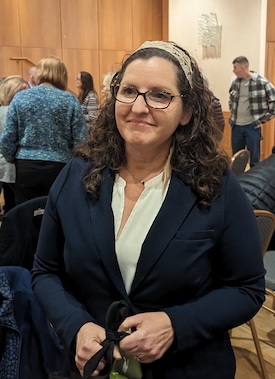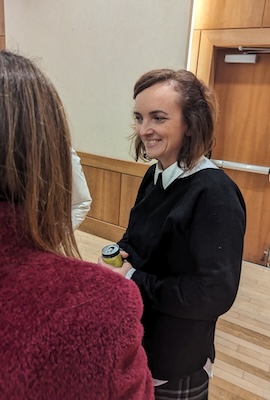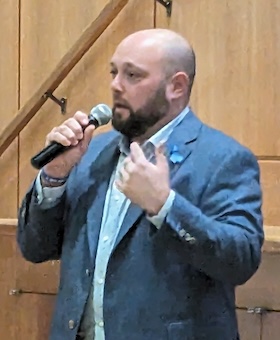A family fleeing war, aided by acquaintances from a lifetime of hospitality. A person’s choice to be the light in a dark world after a loved one was murdered. The creation of a vital medical resource as a tribute to a father who died too young. These three stories were shared at the event A Night of Hope, which was held at the Jewish Community Centre of Greater Vancouver Nov. 30. The three stories of resilience were intended to give hope in response to the trauma Jews worldwide have experienced since Oct. 7.
Rabbi Susan Tendler, spiritual leader of Beth Tikvah Congregation in Richmond, shared “the unlikely story” of how she became a rabbi, in part because of the trauma of having experienced the murder of a loved one.
In the year 2000, she recalled, “I was living my best life.” She thought she knew who she would marry, she had a dream job as a teacher in Israel and was planning on making aliyah.

“I returned to the United States to get my affairs in order before making the big move as the Second Intifada broke out,” she said. Global conflict was compounded in the personal realm when her engagement was broken off. With foreign students avoiding Israel, her job was suddenly eliminated. Things began looking up, though, when she met Mike, “who showed me what partnership might look like.”
“And then, one night, he was brutally murdered,” she said. Five young men, joyriding, had crashed a car and needed another vehicle.
“They came upon Mike and murdered him, not even for his wallet. Just for fun,” Tendler said. “Just to take his car a few miles down the road before they ditched it.”
The murder plummeted her into depths of darkness.
“I couldn’t understand how such palpable evil could exist in the world,” she recalled. “How could a human being, created in the image of the divine, not understand life as sacred? What were the lives of those individuals that they didn’t hold this basic value as truth? And, by doing so, those five young men took the sanctity out of this world for me, for Mike’s family and his friends. I really didn’t care to live in a world with such sheer evil. It wasn’t that I was suicidal – I knew the difference and I wasn’t – I just really didn’t care to live or to die.”
She cited the Israeli poet Yehuda Amichai, who wrote that the Jewish people are “infected with hope.”
“We are taught to love others, to embrace others and to share our burdens with others,” Tendler said. “We need not struggle alone…. So, as I held on, people rallied, surrounded me and guided me through the darkness.”
Overcoming this and other personal and geopolitical traumas led her to an important insight.
“I came to realize that, if I didn’t like living in a world full of darkness and evil, then I needed to be the light,” she said. “I needed to choose life. I needed to choose hope and spread kindness, goodness and godliness to others.
“The world needs us right now,” she continued. “We all have hope coursing through our veins. Certainly, it has been weakened and doubted [since Oct. 7], but that is exactly what they want. We won’t let them win. Let the light created by our hope and optimism join forces, knowing indeed that we are not alone and that this positive energy be magnified as it draws others in. May our light be a beacon for the world.”
Tanja Demajo, chief executive officer of Jewish Family Services, shared her family’s history of survival in the Holocaust and the personal story of her family’s escape from the post-Yugoslavia war in Bosnia, where she was born. She had not shared any of this publicly before.
As a child in Mostar, young Tanja would often come home from school to find strangers at the table. Anyone passing through or needing hospitality was received in their house and welcomed with food.

“My family always kept the door open,” she said. This openness, she believes, helped save her family when war exploded.
In 1992, when she was 11-and-a-half, everything changed, seemingly in a day.
“There were explosions everywhere, there was shooting everywhere, the army was everywhere,” she said. “The city emptied.”
Getting away from the fighting was not easy. Roadblocks were set up by different militias and Demajo could see the fear in her father’s expression as they confronted each successive barrier.
“We had to stop at three different points and at three different points we came across some people that my parents knew through their life,” she recalled. Keeping an open door meant there were people who knew the family and remembered their hospitality. “In each of these three situations, these friends came forward and put their lives on the line so they could let my family pass through.”
After the war ended, the family reconnected with her grandfather, who they had not seen in years.
“That was the first time actually that my grandfather shared with us his own story,” she said. From a community of 300, the grandfather and an uncle were the only survivors of the Holocaust.
She asked him why he was so cheerful, despite all he had gone through.
“He had this beautiful way of just hugging people and he would hug me and say, what are the things you remember as a child?” She recalled spending weekends with her grandfather, the meals and stories they shared. “And he said, well that’s how you survive. Because those are the things that matter. The people you have in your life, the friendships that you share with them and the food you share with them.”
The connections she saw her parents forge at the table – which proved potentially lifesaving as the family fled war – are a lesson she has always carried. It is something that Jews worldwide can remember now, she said.
“We need allies and we need to have these conversations to bring people together,” she said.
Jaime Stein shared the story of how the death his father, Howard Stein, in 2006, from acute leukemia, inspired him to help create Canada’s first public

Early in the last decade, when Stein helped launch the $12.5 million campaign to create the facility, Canada was one of only two G-20 nations that did not have such a service. Umbilical cord blood contains blood-forming stem cells, which can renew themselves and differentiate into other types of cells.
Working with Canadian Blood Services, Stein and the fundraising team for the project decided on a big focal point for the campaign – climbing Tanzania’s Mount Kilimanjaro, the highest peak in Africa.
“We got 25 people to sign up [to climb] and everybody had to raise a minimum of $10,000,” Stein explained.
Stein, in his 30s at the time, when $10,000 was a daunting sum, organized weekly 9 a.m. hikes with friends and strangers, at which he would offer career advice, listen to his hiking mates or otherwise engage, then write a blog post.
“People started donating and people started telling their friends as well,” he said.
In the end, he raised $27,000, second only to the chief executive officer of Canadian Blood Services among the 25 climbers. Of course, the money turned out to be the easy part. They still had to ascend the mountain.
Like many others who climb tall mountains, Stein experienced altitude sickness – so severely he almost had to turn back.
“I could barely make it to camp,” Stein recalls of the onset of the crisis. “I just remember thinking about my dad, thinking of my family, thinking of the training, thinking of everything I did as I tried to get to camp.”
Slowly, his oxygen levels climbed and he was able to complete the trek.
The trip itself raised $350,000 and, eventually, the team raised all the funds necessary. Canada now has a fully functioning umbilical cord blood bank, with four collection sites, including one in Vancouver.
Alan Stamp, Jewish Family Services clinical director, and Ezra Shanken, chief executive officer of the Jewish Federation of Greater Vancouver, contextualized the stories as lessons in resilience community members can use to confront trauma.
